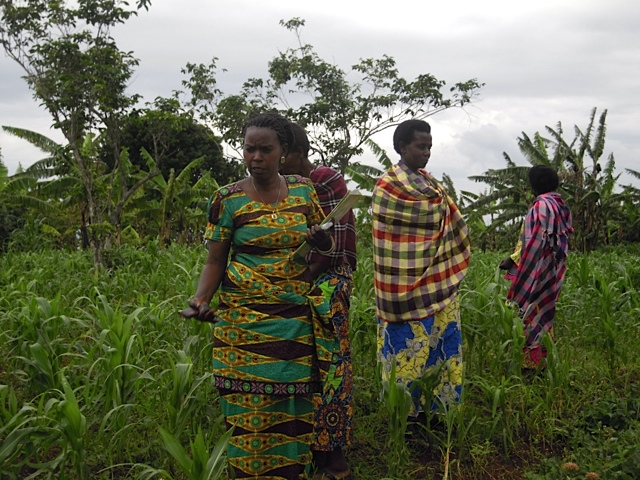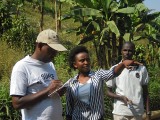
New research from Stuart Jones of the University of Reading (UK) shows that agricultural vulnerability of widow farmers in social processes is largely manifested from actions of extended family, rather than exogenous community factors. Genocide has resulted in a fundamental breakdown in familial units; marginalising the widows from within social structures that should be a first line of support. It highlights that women who are not in grouped settlements, and without membership to AVEGA (the association of widowed genocide survivors) or other support groups, will be increasingly vulnerable to localised ill functioning dispute resolution. It says that it is vital to identify and extend out to these individuals.
According to the research, most of the women were struggling to physically cultivate the land and this will only get worse, even under consolidation. One suggestion would be no-till conservation agriculture, as a direct means of reducing physical hardship associated with hoeing and breaking the soil. Programmes in South America have shown huge success in no till agriculture for increasing yields and improving soil structure and nutrition for small farmers.
The research says that land consolidation is considered to have potential benefits for this case study, but programmes of support around consolidation activities must factor in issues of distance from land, size of plots for diversification, and adapting methods of meaningful participation for those with very little or no education. Widows involved in government led consolidation will require assistance to secure the benefits of involvement.
According to Jones, the NGO and charity based sector is perfectly placed to inform the discourse on what legal services this demographic needs, and “great work” is being supported to this effect by SURF and its partners. In terms of the Jones case study, the most significant factor in resolving agricultural vulnerability is to maintain legal assistance and strengthen the accountability of local resolution institutions for interpreting reforms in law. This requires making it easy and approachable for widows to report grievances they have to an independent body that will actively evaluate and hold accountable low level institutions misinterpreting the law.
Lastly the management and support for coping with trauma, which in many ways remains polarised in the fabric of the landscape for these women has been profoundly important and clearly remains vital for this group in the future. The counselling services being provided by SURF and AVEGA are manifestly important to these women for maintaining their agricultural livelihoods.
“They are saying, she is old, we are the children and we must occupy everything, and she doesn’t have right to produce on that land”
“Agricultural security and inclusion in post genocide Rwanda; Case study of widow farmers in the district of Rwamagana.”
By Stuart Jones, Graduate Institute of International Development and Applied Economics, University of Reading, UK
Extract from dissertation prepared in partial fulfilment of the requirements for the Master of Science Degree in Agriculture and Development
September 2014
In July 2014 a case study of widows of the genocide were interviewed in Rwamagana district to establish how social status of widowhood impacted agricultural livelihoods since 1994. The women were widows of civil marriages, all were land owners and heads of their household. For this reason the article cannot generalise for the large amount of landless widows or those from polygamous unions; who will no doubt be increasingly vulnerable.
Alongside severe shortfalls in agricultural resources impacting the wider population (Inc. credit, fertilisers and technology), the widows face isolation in farming and inability to cultivate the entirety of their land, resulting in loss of household nutrition and income. The women had low levels of membership to productive groups and agricultural training due to unavailability of initiatives rather than exclusion. Government land consolidation was found to be beneficial for those involved, increasing community support, training and access to credit. However the depth and range of benefits diminished for those with small plot sizes; large distance of land from residence; and lack of education/ability to read and write. These factors must be considered under further adoption of the land policy.

In the past 20 years the women reported very little disunity or hostile behaviour within their communities, but acknowledged that others with visible scars had found it much harder. Isolated incidents of hostility did not impact the women’s agricultural activities. However the key finding was that genocide resulted in a fundamental breakdown in familial units; marginalising the widows from within social structures that should be a first line of support. Dispute over land from family members and in-laws is an extremely common and alienating occurrence. Resolutions of disputes are long and tiring procedures resulting in limited or no access to agricultural land during the process. Despite the widows being easy targets for unlawful land and property claims, most had little to no knowledge of reforms in laws protecting their rights. Bias and corruption at local levels is also an important issue. Formal courts often contradicted weak lower level interpretation of laws. Prejudicial attachments to customary norms are diminishing the rights and agricultural security of these women.
“Local leaders refused to help her and solve her problems, and her grandchildren took her away from everything she owned…they have been bad with her because local leaders get money from, corruption, from those ladies (grandchildren) and then refused to help her”
In terms of this case study the most significant factor in resolving agricultural vulnerability is to maintain and further extend legal assistance to widows, particularly those who are geographically isolated. It is important to strengthen the accountability of local resolution institutions, by providing reporting mechanisms to an independent body that will actively evaluate and hold accountable low level institutions misinterpreting the law. Secure land tenure is key to involvement in productive groups and official policy of land consolidation. Community acceptance and support for the group was good, however the status of widowhood will continue to result in hostility from family and extended family members, significantly jeopardising the land security and agricultural livelihood of this group.
